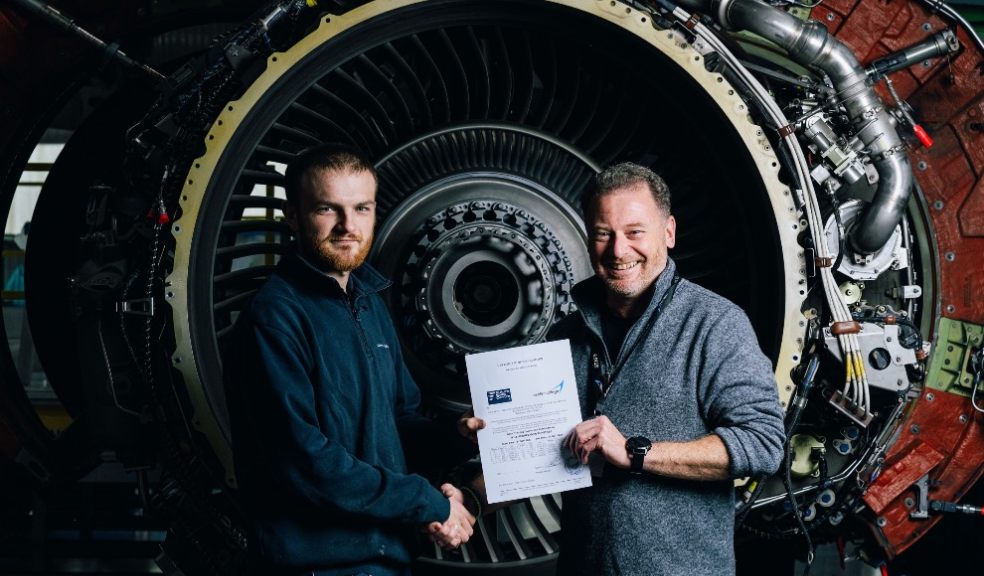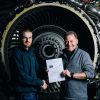
Exeter College approved to deliver the Civil Aviation Authority Part 66 Licence
Exeter College has been delivering higher level courses in aircraft engineering since the early 2000s, with new partnerships and opportunities in the sector reflected in the changes in its offer over time.
This year the College became one of only three in England approved to sign off engineers for the UK Civil Aviation Authority (CAA) Part 66 Licence (issued under the CAA’s Part 147 regulation). This certification covers a specific practical element of the Licence which is essential in signing off for operation any aircraft registered in the UK.
The Licence is delivered as part of the College’s Foundation Degree (FdA) in Aircraft Engineering which is awarded by Kingston University London and approved by the CAA. Most people who train for this accreditation will do it directly with an airline, so this is a unique offer for any college. Students on the FdA programme need to complete 2400 learning hours across two years (with a combination of time in the classroom and in the hangar). Students benefit from the use of facilities at Exeter Aerospace (EA) throughout their training. The support from EA in providing access to their modern, purpose-built hangars and workshops is invaluable to the quality and breadth of experience students receive, giving them access to a UK CAA Part 145 environment, an essential criterion for Licence approval by the Authority itself.
Andy Wells, Head of Faculty for Engineering, Aerospace and Automotive, said; "This programme is a vital cog in providing the skills required across maintenance repair organisations across the whole of the South West. Students enrol from across the region, which enables us to successfully set up apprenticeship opportunities and careers development with employers in their areas. We are proud to be one of only a few Part 147 organisations delivering this vital training.
"Students completing their Foundation Degree receive their Part 66 Licence certificate, an essential steppingstone in gaining full accreditation. Once graduates are issued their certificate it allows them to apply for their full Licence after only two years in industry, rather than the normal five: the certificate significantly reducing the time it would take these engineers to fully qualify.
"We are seeing many opportunities in the aviation industry right now. Of the recent FdA cohort, all ten graduates were offered jobs at Exeter Aerospace, with nine accepting and one continuing to Kingston University to study the top-up degree. "
Pictured is Foundation Degree student, Charlie Putt, receiving his Part 66 Licence certification from Mike Robinson, Programme Lead in Aeronautical Engineering, earlier this month.
“In our experience students in the main want to stay local and we are fortunate that there are opportunities like those at Exeter Aerospace right on our doorstep,” says Mike Robinson, Programme Lead in Aeronautical Engineering.
This is an exciting time for graduates intent on moving into the aviation sector. At both national and international level, the aviation industry is facing a significant shortage of suitably certificated engineers, and the College is now receiving enquiries directly from airlines looking for qualified staff. For those students who do wish to go further afield there is a multitude of avenues open to them. Better still, aircraft engineers can hope to earn anything between £40k-£50k within three to five years of qualifying, nearly £10k above the average UK annual salary (according to the latest earnings report by the ONS).
The College currently offers a range of courses and training opportunities in aeronautical engineering at varying levels, including a full time Level 3 BTEC in Aeronautical Engineering, and progression pathways including the Level 5 Foundation Degree in Aeronautical Engineering and an Apprenticeship in Aircraft Maintenance. Building on the success of its Skills Bootcamps (funded short-term, part-time practical courses), Exeter College now also delivers a Skills Bootcamp in Aviation in partnership with Exeter Aerospace.
Pictured is Foundation Degree student, Charlie Putt, receiving his Part 66 Licence certification from Mike Robinson, Programme Lead in Aeronautical Engineering, earlier this month.

















